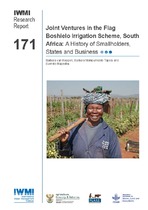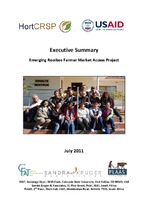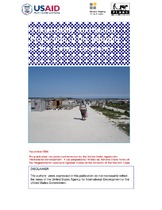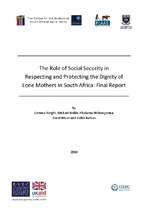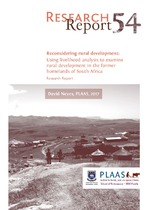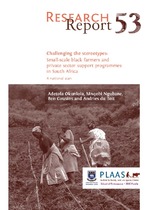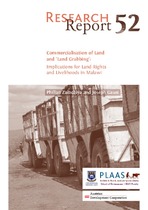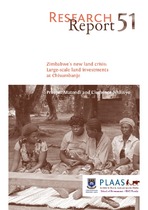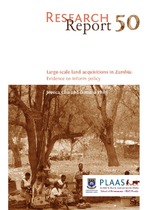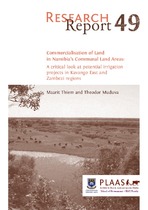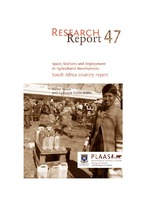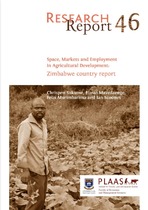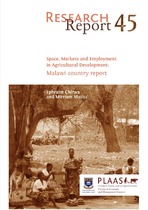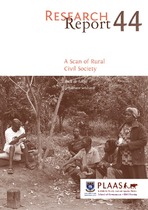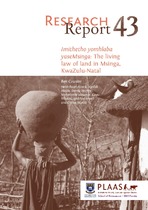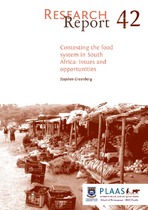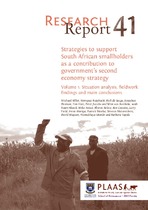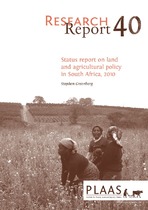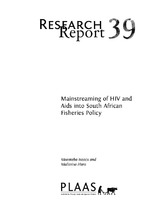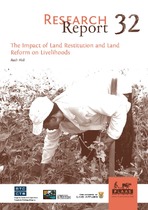Research Reports: Recent submissions
Now showing items 21-40 of 97
-
Joint ventures in the flag Boshielo irrigation scheme, South Africa: A history of smallholders, states and business
(Institute for Poverty, Land and Agrarian Studies, University of the Western Cape, 2015)In the global debates on the modes of farming, including irrigated farming, that are viable for the majority of rural people, three models prevail: (i) smallholder family farming; (ii) farming led by agribusiness’ ... -
Emerging rooibos farmer market access project
(Institute for Poverty, Land and Agrarian Studies, University of the Western Cape, 2011)Global markets increasingly require rapid and coordinated response to standards and certification. Yet despite broad political transformations in post‐Apartheid South Africa, structural power relations limit emerging farmer ... -
Vulnerability and social protection at the margins of the formal economy
(Institute for Poverty, Land and Agrarian Studies, University of the Western Cape, 2006)This report sets out the results of an in-depth study of livelihood strategies and ‘coping mechanisms’ among poor people in one very specific, but highly significant context of poverty in South Africa. Its core concrete ... -
The role of social security in respecting and protecting the dignity of lone mothers in South Africa: Final report
(Institute for Poverty, Land and Agrarian Studies, University of the Western Cape, 2014)This is the final report of a project entitled ‘Lone Mothers in South Africa: The role of social security in respecting and protecting dignity’. The project was inspired by research undertaken for the South African ... -
Reconsidering rural development: Using livelihood analysis to examine rural development in the former homelands of South Africa
(Institute for Poverty, Land and Agrarian Studies, University of the Western Cape, 2017)‘Rural development’ as concept and focus of public policy is comparatively new, having emerged in the post-war period. Much of the impetus for ‘rural development’ arose in the context of newly decolonised, low-income ... -
Challenging the stereotypes: Small-scale black farmers and private sector support programmes in South Africa
(Institute for Poverty, Land and Agrarian Studies, University of the Western Cape, 2016)This report represents one of the outputs of a research and social dialogue project undertaken over 18 months. It was carried out by researchers from the Institute for Poverty, Land and Agrarian Studies (PLAAS), based ... -
Commercialisation of land and ‘Land Grabbing': Implications for Land Rights and livelihoods in Malawi
(Institute for Poverty, Land and Agrarian Studies, University of the Western Cape, 2015)This study investigates the processes and impact of commercialisation of land in Malawi – specifically the acquisition of huge tracts of communal lands by foreign companies and local elites for sugarcane production in ... -
Zimbabwe's new land crisis: Large-scale land investments at Chisumbanje
(Institute for Poverty, Land and Agrarian Studies, University of the Western Cape, 2015)Zimbabwe’s investments in agriculture, after a contested Fast Track Land Reform Programme (FTLRP) underpinned by often violent land occupations (these were largely contained by the state by 2005), have triggered a ... -
Large-scale land acquisitions in Zambia: Evidence to inform policy
(Institute for Poverty, Land and Agrarian Studies, University of the Western Cape, 2015)Land in Zambia plays a vital role in sustaining livelihoods, ensuring food security and reducing poverty. If people are not able to access land (including communal interests, such as lands for grazing or access to water ... -
Commercialisation of land in Namibia’s communal land areas: A critical look at potential irrigation projects in Kavango East and Zambezi regions
(Institute for Poverty, Land and Agrarian Studies, University of the Western Cape, 2015)Large-scale land acquisitions by both foreign and local investors for agriculture, forestry and wildlife purposes, among others, remain a major challenge for African governments. In recent years, the Namibian ... -
Space, markets and employment in agricultural development: South Africa country report
(Institute for Poverty, Land and Agrarian Studies, University of the Western Cape, 2015)Throughout much of the developing world, including sub-Saharan Africa, agriculture is frequently viewed as central to efforts to foster development and reduce poverty. Key conceptual and policy issues accordingly raised ... -
Space, markets and employment in agricultural development: Zimbabwe country report
(Institute for Poverty, Land and Agrarian Studies, University of the Western Cape, 2015)Since independence in 1980, Zimbabwe has undergone several phases of land redistribution, generally to communal and working people. The latest phase was the Fast-Track Land Reform Programme (FTLRP), which began in 2000 ... -
Space, markets and employment in agricultural development: Malawi country report
(Institute for Poverty, Land and Agrarian Studies, University of the Western Cape, 2015)There is a growing literature on the links between farm and non-farm employment activities in rural societies and the important roles played by rural non-farm employment in poverty reduction (Lanjouw, 2001; Davis et al., ... -
A scan of rural civil society
(Institute for Poverty, Land and Agrarian Studies, University of the Western Cape, 2013)PLAAS commissioned Phuhlisani to undertake a review of rural civil society, to explore innovative ways in which researchers and organisations in rural civil society can work together in linking research to policy ... -
Imithetho yomhlaba yaseMsinga: The living law of land in Msinga, KwaZulu-Natal
(Institute for Poverty, Land and Agrarian Studies, University of the Western Cape, 2011)This report describes the ‘living law’ of land in one part of Msinga, a deep rural area of KwaZulu-Natal. It presents research findings from the Mchunu and Mthembu tribal areas, where a three-year action-research ... -
Contesting the food system in South Africa: Issues and opportunities
(Institute for Poverty, Land and Agrarian Studies, University of the Western Cape, 2010)Rising food prices have become a growing concern globally and in southern Africa. In South Africa, where food availability is not an issue at present, the response has been to try to improve access to food, mostly ... -
Strategies to support South African smallholders as a contribution to government’s second economy strategy: Volume 1: Situation analysis, fieldwork findings and main conclusions
(Institute for Poverty, Land and Agrarian Studies, University of the Western Cape, 2010)Within the ambit of the Accelerated and Shared Growth Initiative of South Africa, government is leading a process to define a Second Economy Strategy. One of the opportunities that has been identified is the agricultural ... -
Status report on land and agricultural policy in South Africa, 2010
(Institute for Poverty, Land and Agrarian Studies, University of the Western Cape, 2010)Agriculture plays numerous roles in society. The most obvious is to produce food (and, to a lesser extent, fibre). While agriculture is the mainstay of the rural economy, it also shapes social relations and landscapes. ... -
Mainstreaming of HIV and Aids into South African fisheries policy
(Institute for Poverty, Land and Agrarian Studies, University of the Western Cape, 2008)HIV/Aids is one of the most serious health, economic and social issues facing southern Africa today (UNAIDS; Heywood 2004). Although only 10% of the world’s population lives in Sub-Saharan Africa, 64% of the 39.5 million ... -
The impact of land restitution and land reform on livelihoods
(Institute for Poverty, Land and Agrarian Studies, University of the Western Cape, 2007)This thematic paper investigates emerging trends evident in the limited literature available on the impact of land restitution on livelihoods, and suggests ways of thinking about, and planning for, livelihoods. The ...

